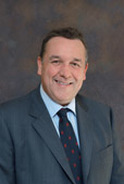
It was clear from his talk that individuals of course acted immorally by rigging rates such as libor, misselling products such as PPI and acting recklessly on the markets. The targets set by banks for their employees, coupled with big bonuses made unethical practice all too tempting. He suggested that much of this practice has now been expunged from RBS thanks to a change in management and a focusing on the British market (what the bank was originally set up for). He did however admit that many banks have adopted an “ethical veneer” to appear better to the public without really changing their practices.

He argued that it is impossible for banks to make decisions about who to lend to or not based on consequences (teleology). Take for example a weapons company such as BAE Systems. If a bank works with them then they are involved in a business whose weapons might be in the hand of the so-called Islamic State, equally they might be used to fight terrorism. And if they don’t support them then the 34,800 people emaployed by BAE in the UK might lose their jobs. Mr Elliot argued that such decisions are impossible to make.

Of course there are many who would disagree with Mr Elliot including the Move Your Money campaign, which launched in March 2012 to encourage individuals and businesses "to move their money to more ethical and socially responsible banks". It uses ratings from the Ethical Consumer magazine to rate how ethical a bank is and advocates funding options such as crowdfunding and peer-to-peer lending. They would suggest that by having deontological principles that must not be compromised, it is possible for people to choose to boycott those banks that they deem to be reckless or unethical.
Mr Elliot’s talk was a very interesting insight into the workings of RBS and its fate since 2008; certainly it got the audience thinking about where moral responsibility lies and if in fact, as he argued, banking is an amoral activity.


 RSS Feed
RSS Feed
